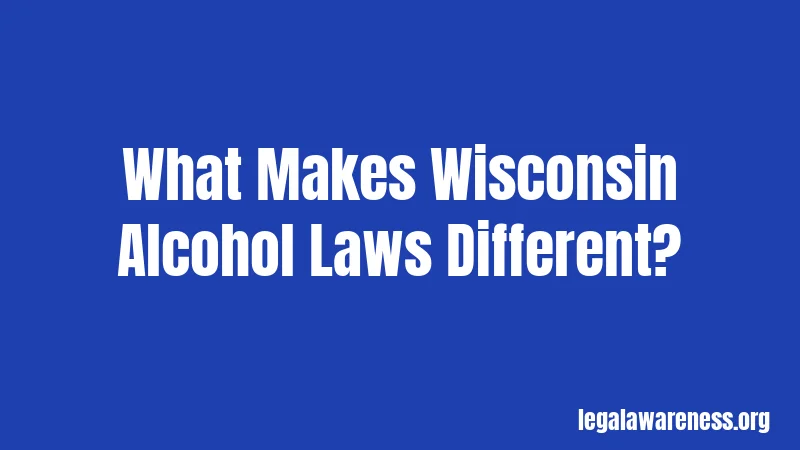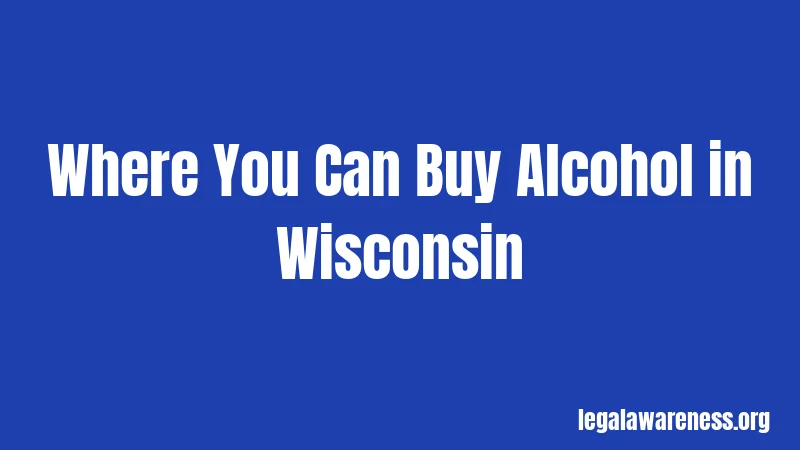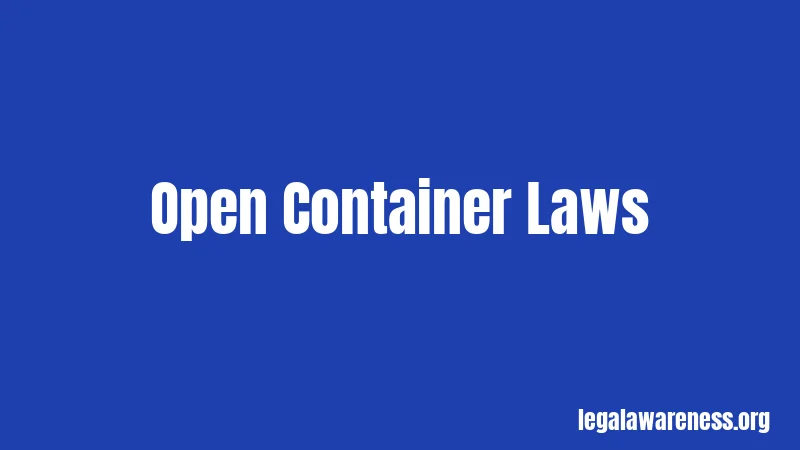Alcohol Laws in Wisconsin (2026): Drinks, Driving, and What’s Legal
Most people don’t realize Wisconsin has some pretty unique alcohol laws. Seriously. Like, did you know a 16-year-old can legally drink at a bar with their parents?
Wisconsin’s alcohol rules are different from almost every other state. Some laws are super relaxed. Others will hit you hard if you mess up. Let’s break down exactly what you need to know so you don’t get caught off guard.
What Makes Wisconsin Alcohol Laws Different?

Wisconsin has a reputation for being friendly to drinkers. That’s putting it lightly. The state has some of the most permissive alcohol laws in the country.
But here’s the thing. Just because something seems chill doesn’t mean there aren’t serious consequences for breaking the rules. You could face fines, license suspension, or worse. So yeah, it pays to know what’s actually legal.
The Legal Drinking Age in Wisconsin
The legal drinking age is 21. That’s the same as every other state. No surprises there.
But Wisconsin has a special twist. Minors can drink with their parents, guardians, or spouses who are 21 or older. Yes, you read that right. A restaurant can legally serve alcohol to a teenager if their mom or dad is sitting right there.
This applies at bars, restaurants, and even at home. Pretty straightforward. But there’s a catch. The business owner can still say no. They don’t have to serve minors even if a parent is present. It’s totally up to them.
Age Requirements for Drinking With Parents
Here’s where it gets interesting. The law doesn’t specify a minimum age for drinking with parents. Technically, there’s no age limit mentioned in the statute.
That means even younger kids could drink with their parents under Wisconsin law. Most establishments won’t serve anyone under 18 though. They set their own rules.
Want to know the craziest part? Even if a minor drinks with a parent, they still can’t drive. Wisconsin has an absolute sobriety law for anyone under 21 behind the wheel. Zero tolerance. We’ll get to that in a minute.
Where You Can Buy Alcohol in Wisconsin

Wisconsin makes it easy to buy alcohol. Grocery stores sell beer, wine, and liquor all in the same place. No separate liquor stores required.
Gas stations carry alcohol too. Same with convenience stores. Basically, if it’s a retail shop, it probably sells alcohol.
Hold on, this part is important. There are time restrictions on when you can buy.
Alcohol Sales Hours
Stores can sell alcohol starting at 6 a.m. every day. That includes Sunday. Beer sales must stop at midnight. Liquor and wine sales must stop at 9 p.m.
These are state-wide rules. But some cities have stricter hours. Always check your local rules if you’re not sure.
Bars and restaurants have different hours. They can serve alcohol until 2 a.m. Sunday through Thursday. On Friday and Saturday, they can stay open until 2:30 a.m. On New Year’s Day, there’s no closing time. Pretty cool, right?
Underage Drinking Penalties
Not sure what counts as a violation? Let’s clear that up right now.
If you’re under 21 and drinking without a parent, guardian, or spouse of legal age, you can get a ticket. This is called a civil citation. It’s not a criminal charge, but it’s still gonna cost you.
Fines for Underage Drinking
For ages 17-20, the fine is $100 to $200 for a first offense. That’s for knowingly possessing or consuming alcohol.
If you get caught twice in the same year, the penalties go up. Third time? They go up again. The fines can eventually reach several hundred dollars.
Wondering if this applies to you? If you’re drinking without your parent or guardian present and you’re under 21, the answer is yes.
What About Fake IDs?
Making or selling fake IDs is a felony in Wisconsin. We’re talking serious stuff here. You could face up to $10,000 in fines. You could also get up to 3 years in prison.
Using a fake ID is also illegal. Don’t risk it. The penalties are way worse than just waiting until you’re 21.
Open Container Laws

You can’t have an open container of alcohol in your car while driving. The container must be in the trunk. If your car doesn’t have a trunk, it needs to be out of reach of the driver and passengers.
Here’s what doesn’t count as “out of reach.” The glove compartment. The center console. Those are still considered accessible.
Drivers and passengers can both get tickets for open containers. The fine varies by city. But it’s usually a couple hundred dollars at minimum.
Exceptions to Open Container Rules
Chauffeured buses and limousines are exempt. You can drink in those. Makes sense for party buses and stuff.
Walking around with open containers is generally illegal too. Unless you’re in a designated area. Cities create special zones during events and festivals. These are clearly marked. If you’re not sure, don’t risk it.
Drinking in Public
It’s not illegal to drink in public in Wisconsin if you’re over 21. Surprised? Most people are.
But here’s the catch. You can’t get so drunk that you cause a disturbance. If you do, you can get a ticket for disorderly conduct.
The fine for disorderly conduct varies. It’s usually a civil citation with a monetary fine. Serious offenses can be charged as criminal misdemeanors. Those come with up to a $1,000 fine. You could also face up to 90 days in jail.
Operating While Intoxicated (OWI) Laws
Wisconsin calls drunk driving “OWI” instead of “DUI.” It stands for Operating While Intoxicated. Same thing, different name.
The legal BAC limit is 0.08% for most drivers. For commercial drivers, it’s 0.04%. For anyone under 21, it’s 0.00%. Yep, zero tolerance.
First Offense OWI Penalties
A first OWI is technically a civil offense in Wisconsin, not a criminal one. But don’t let that fool you. The penalties are still serious.
You’ll face a fine between $150 and $300. Plus a $435 surcharge. Your license gets revoked for 6 to 9 months. You’ll need to complete an alcohol and drug assessment. Your insurance rates will skyrocket.
If your BAC was 0.15% or higher, you’ll need an ignition interlock device for at least one year. That’s a breathalyzer you blow into before your car starts. You pay for installation and monthly fees. Those can add up to hundreds of dollars.
Higher BAC Means Harsher Penalties
Honestly, this is the part most people miss. If your BAC is 0.15% or higher, penalties increase. You’re looking at a 12-month license revocation instead of 6-9 months. Plus the ignition interlock device requirement.
Having a minor in the car makes things way worse. Even a first offense can become a criminal charge if you have a passenger under 16.
Second and Third Offense OWI
Second offense is a misdemeanor. You’ll face 5 days to 6 months in jail. Fines range from $350 to $1,100. Plus that $435 surcharge again. License revocation is 12 to 18 months.
Third offense? Also a misdemeanor. But now you’re looking at mandatory jail time. Between 45 days and 1 year. Fines go up to $2,000. License revocation is 2 to 3 years.
All repeat offenders must install an ignition interlock device. No exceptions.
Fourth Offense and Beyond
Fourth offense OWI is a felony. Class H felony, to be specific. You could face up to 6 years in prison. Fines can reach $10,000.
Fifth and sixth offenses are Class G felonies. Those come with up to 10 years in prison. Fines can go as high as $25,000.
Seventh through ninth offenses are Class F felonies. Tenth offense is a Class E felony. The penalties just keep getting worse.
Absolute Sobriety for Drivers Under 21
If you’re under 21, you cannot have any alcohol in your system while driving. Any detectable amount is illegal. This is called the absolute sobriety law.
The penalty is a $200 fine. You also face a 3-month license suspension. Your insurance rates will jump. If you’re in college, you could lose scholarships.
Sound complicated? It’s actually not. Just don’t drink and drive if you’re under 21. Ever.
Implied Consent Law
Wisconsin has an implied consent law. That means by driving on public roads, you automatically agree to chemical testing if police suspect you’re impaired.
Refusing the test has serious consequences. You’ll face an automatic one-year license suspension. The refusal can be used as evidence against you in court. Penalties for refusal can actually exceed those for a first-offense OWI.
Okay, pause. Read this carefully. Refusing a chemical test is usually a bad move. It doesn’t help your case. It makes things worse.
Drinking on Boats
Most people think OWI only applies to cars. Nope. You can get an OWI on a boat too.
The same 0.08% BAC limit applies. Operating a boat while intoxicated is illegal. First offense is a civil violation, just like with cars. Penalties include steep fines.
You can also get an OWI on a bicycle. Or a snowmobile. Or an ATV. Basically, if it’s a vehicle, the OWI laws apply.
Furnishing Alcohol to Minors
Don’t give alcohol to minors who aren’t your own children. This is illegal unless you’re their parent, guardian, or spouse of legal drinking age.
The penalties are harsh. For a first offense, you could face a fine up to $500. You could also get up to 30 days in jail. Or both.
Repeat offenses within 30 months? The penalties jump. You could face fines up to $10,000. Jail time can reach 9 months.
Adults who host underage drinking parties can face criminal charges. If an underage person drives home drunk from your party and hurts someone, you could be held liable in a civil lawsuit. This is serious stuff.
Social Host Liability
Wisconsin has what’s called “social host” laws. If you knowingly allow underage drinking on your property, you can be charged. This applies even if you didn’t provide the alcohol yourself.
The penalty for this violation is a fine between $100 and $500. You could also face up to 60 days in jail.
Wisconsin doesn’t have a minimum age requirement for who can drink with parents. But you, as a property owner, can still be held responsible if underage drinking happens on your property without parental supervision.
Dram Shop Laws
“Dram shop” refers to establishments that serve alcohol. Wisconsin has dram shop laws that hold bars and restaurants liable if they serve alcohol to someone who then causes harm.
If you serve an intoxicated person and they hurt someone, your business can be sued. If you serve a minor who then causes harm, same thing. You’re opening yourself up to massive civil liability.
This is why most bars and restaurants are strict about checking IDs. They’re protecting themselves legally.
New Alcohol Laws (2024-2025)
Wisconsin passed major alcohol law changes in 2023. Most took effect on May 1, 2024. Some changes started January 1, 2025.
Here’s what changed. The state created a Division of Alcohol Beverages within the Department of Revenue. This new division handles all alcohol licensing and enforcement. Previously, these duties were scattered across different departments.
Statewide Bartender License
Starting January 1, 2025, Wisconsin has a statewide bartender license. This is called an operator’s permit. It’s valid in all Wisconsin municipalities. Before, you needed separate licenses for each city.
This makes it way easier for bartenders to work in different cities. No more juggling multiple licenses.
Changes for Alcohol Producers
Breweries, wineries, and distilleries got more freedom. They can now sell a wider range of products at their production facilities. They can also stay open later than before.
The rules are more consistent across all types of producers now. Contract manufacturing rules were clarified too.
Event Venue Requirements
By January 1, 2026, event venues like wedding barns must hold liquor licenses if they host more than six events per year that serve alcohol. There’s a separate permit for venues that host six or fewer events.
This affects a lot of wedding and event spaces. If you run one of these venues, make sure you’re in compliance.
Special Circumstances
Wisconsin has some unique situations worth knowing about.
Alcohol at Funerals
Funeral homes generally can’t get liquor licenses. They don’t meet the health and sanitation requirements. Plus, there are restrictions on what types of businesses can operate on Class B licensed premises.
Alcohol in Parks
Generally, you can’t drink in public parks unless the city allows it. Green Bay recently changed its rules for the 2025 NFL Draft. People could buy and drink beer in certain parks during the event.
Many cities create temporary permits for festivals. These are clearly marked. If you’re not in a designated area, assume drinking isn’t allowed.
Daylight Saving Time Rules
On the second Sunday in March, when clocks spring forward, bars can stay open until 3:30 a.m. On the first Sunday in November, when clocks fall back, bars must close by 2:30 a.m.
This prevents anyone from getting an “extra hour” of drinking time during the time change.
How to Stay Out of Trouble
Let’s talk about staying safe and legal. Most violations are totally avoidable.
If you’re under 21, don’t drink without your parents present. If you’re over 21 and hosting a party, don’t let minors drink on your property. If you’re drinking, don’t drive. Use a rideshare, call a friend, or spend the night where you are.
Check your local laws too. Cities can be stricter than state laws. What’s legal in one city might not be in another.
Trust me, this works. The penalties for alcohol violations in Wisconsin can follow you for years. First OWI convictions stay on your record forever. There’s no expungement.
What to Do if You Get a Ticket
If you get a ticket for an alcohol violation, take it seriously. Even civil citations can have long-term consequences.
For OWI charges, contact a lawyer immediately. You have only 10 days to request an administrative review hearing. Missing this deadline means automatic license suspension.
For underage drinking citations, you might qualify for a diversion program. Many counties offer alcohol education classes. Completing these can sometimes get your charges dismissed.
Don’t ignore the ticket. That makes everything worse. You could face additional fines. Your license could be suspended. Courts don’t look kindly on people who blow off their citations.
Resources and Getting Help
If you need help with alcohol issues, Wisconsin has resources available. The state requires alcohol and drug assessments for anyone convicted of OWI. These assessments connect you with treatment if needed.
Many counties offer AODA (Alcohol and Other Drug Abuse) education programs. These are designed to reduce high-risk behavior. They teach about Wisconsin laws and personal decision-making.
Contact your local county health department for more information about these programs. They can point you in the right direction.
Frequently Asked Questions
Can minors drink with their parents in Wisconsin? Yes. Minors can drink if accompanied by a parent, guardian, or spouse of legal drinking age. But the establishment can refuse service. It’s up to the business owner.
What are the alcohol sales hours in Wisconsin? Stores can sell beer from 6 a.m. to midnight. Liquor and wine can be sold from 6 a.m. to 9 p.m. Bars can serve until 2 a.m. Sunday through Thursday, and 2:30 a.m. Friday and Saturday.
Is a first OWI a criminal offense in Wisconsin? No, a first OWI is a civil offense unless there are aggravating factors like having a minor in the car or causing injury. But it still comes with serious penalties including fines and license revocation.
Can you walk around with an open container in Wisconsin? Generally no, unless you’re in a designated area. Cities create open carry zones for festivals and events. These areas are clearly marked.
What happens if you refuse a breathalyzer in Wisconsin? Your license is automatically suspended for one year. The refusal can be used as evidence against you in court. Penalties for refusing often exceed those for a first-offense OWI.
Final Thoughts
Now you know the basics. Wisconsin’s alcohol laws are unique. The state allows things most states don’t, like minors drinking with parents. But the penalties for violations are real.
The biggest mistake you can make is assuming you know the rules without actually checking. Or thinking “it’s just Wisconsin, they’re chill about drinking.” The penalties for OWI and furnishing alcohol to minors can seriously mess up your life.
When in doubt, play it safe. Don’t drink and drive. Don’t give alcohol to minors. Check local laws before assuming something’s legal.
Stay informed, stay safe, and if you’re ever unsure, look it up or ask a lawyer.
References
- Wisconsin Statutes Chapter 125 – Alcohol Beverages (https://docs.legis.wisconsin.gov/statutes/statutes/125)
- Wisconsin Department of Revenue – Alcoholic Beverages Division (https://www.revenue.wi.gov/Pages/FAQS/ise-atundrg.aspx)
- Wisconsin DMV – Impaired Driving (OWI) Information (https://wisconsindot.gov/pages/dmv/license-drvs/susp-or-rvkd/owi.aspx)
- 2023 Wisconsin Act 73 – Alcohol Beverage Law Changes (https://docs.legis.wisconsin.gov/2023/related/acts/73)
- Wisconsin Legislative Council – Alcohol Beverages and Cannabis Publications (https://legis.wisconsin.gov/lc/publications/alcohol-beverages-and-cannabis/)
